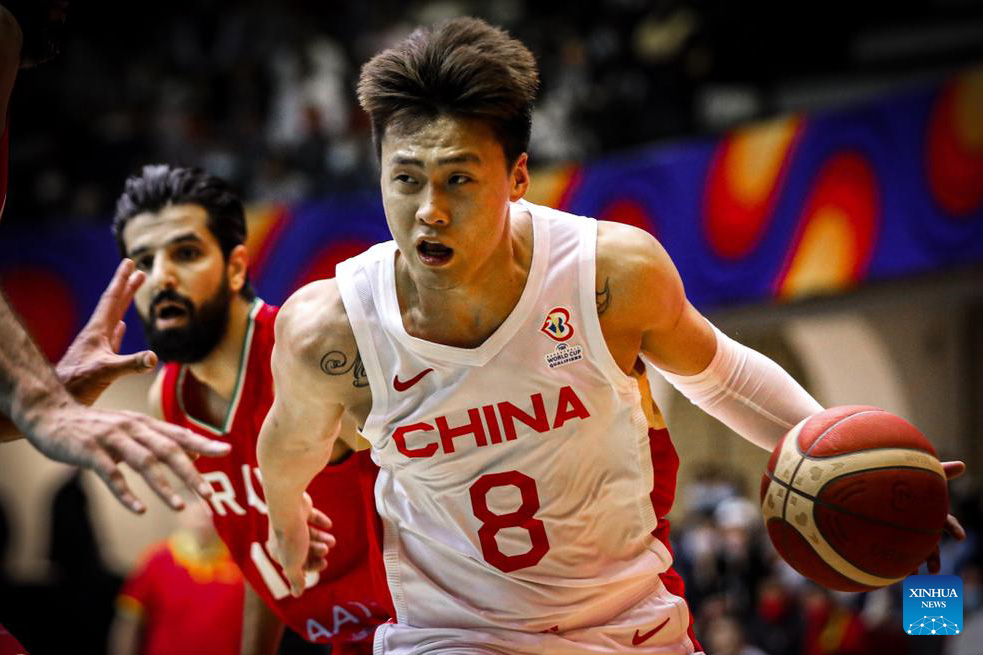Team China weighs up overseas upgrade to bolster Paris push
 0 Comment(s)
0 Comment(s) Print
Print E-mail China Daily, April 10, 2023
E-mail China Daily, April 10, 2023
Missing the Team China that once had NBA players on its roster? It seems fans may not have to wait much longer for those days to return, even though no Chinese are currently playing in basketball's premier league.

Inspired by the policy's success in other sports, China's men's national basketball program is embracing the idea of naturalizing foreign-born talents to enhance the team, with the all-important battle for an Olympic ticket at this year's FIBA World Cup fast approaching.
Minnesota Timberwolves forward Kyle Anderson is reportedly a target of the Chinese Basketball Association's talent search, thanks to his strong all-around game and the heritage of his mother, whose grandfather was Chinese.
CBA president Yao Ming confirmed on Friday that bringing in a reinforcement from overseas is under discussion.
"We are open to talent naturalization but it has to be done based on a couple of principles," Yao said during a CBA media day in Beijing.
"It must be operated in compliance with the relevant laws of our country, FIBA regulations and only with players willing to blend in with our culture," said Yao, who won reelection in December after leading the CBA for an initial term of five years.
As a former NBA All-Star with the Houston Rockets, Yao, however, refused to divulge any details about Anderson as a potential candidate, instead stressing that the CBA is open to all options that meet its primary criteria.
"As long as requirements of laws, regulations and cultural integration are met, we won't say no to any potential fits. The higher level they are the better," he said.
Born in New Jersey and drafted as a first-round pick by the San Antonio Spurs in 2014, Anderson has averaged 9.4 points, 5.3 rebounds and 4.9 assists in 68 games this year for Minnesota as a playmaking forward in his ninth NBA season.
In 2018, Anderson and his mother Suzanne visited Xinmu new village in southern metropolis Shenzhen, Guangdong province, to seek out their roots. Their long-lost Chinese relatives welcomed them with a firecracker show, traditional cultural experiences and a huge banquet.
In video footage of the trip, Anderson described it as "one of the best times and moments" of his life. "It's weird to come to a place I've never been before, yet feel at home. I can't explain in words ... I am so thankful and honored that these people would accept me and give such a warm welcome," he told Shenzhen TV at the time.
According to FIBA rules, each national team can include only one naturalized player. That player must have obtained citizenship of the adopted home country after turning 16 and never have represented his or her native country internationally. Eligibility is subject to approval by FIBA's secretary general.
"We have to figure out the rules and mandatory procedures to avoid any setbacks once we decide to give it a go," said Yao.
Anderson would join a glittering cast of naturalized athletes to choose to suit up for China. They include California-born Olympic champion freestyle skier Gu Ailing, Canadian-born ice hockey player Brandon Yip and, most recently, Hungarian-born short-track speed skating brothers Sandor Liu Shaolin and Liu Shaoang.
If his addition is confirmed, the versatile 6-foot-9 (2.06-meter) forward would certainly boost China's chances at the 2023 World Cup, where only the best-performing Asian team wins direct qualification for next year's Paris Olympics.
Tall task
Pursuing naturalized talents is a controversial topic within China's sports community, and is indicative of just how desperate the CBA is to secure Paris 2024 qualification. The men's team missed the Olympic tournament for the first time in history at Tokyo 2020 following a disappointing campaign at the home World Cup in 2019.
Working with a young, work-in-progress squad, Team China head coach Aleksandar Djordjevic faces a major challenge at the World Cup, with ambitious co-hosts Japan and the Philippines as well as a surging Lebanon — all bolstered by naturalized players — battling for Asia's solitary direct qualification berth.
With only four months to go before the World Cup tips off on Aug 25, Team China's internal challenges appear to be just as tough.
Towering center Zhou Qi, the backbone of the team since Yao's generation all retired, has no league games to play at the moment due to a contract dispute with the Xinjiang Flying Tigers.
Zhou, who started the 2022-23 season in Australia with the South East Melbourne Phoenix, decided in December to return to the CBA to sign with a new club, only for Xinjiang to block his release.
Citing a league rule that a club can retain a player as long as it has offered him a maximum contract to match any other offers, the Flying Tigers attempted to hang onto Zhou after his return from Australia. However, negotiations over the dispute reached deadlock.
With the team's biggest star working on his own without any club action as a grind, Yao admitted that Zhou's situation is far from ideal.
"A player's competitive form will for sure be affected if he has no high-level games to play. We do have concerns about him (Zhou) but can only hope that he maintains good enough training on his own," Yao said.
"For the World Cup, our goal will always be the same and that is to earn direct qualification for the Olympics."
|<<Previous12






Go to Forum >>0 Comment(s)